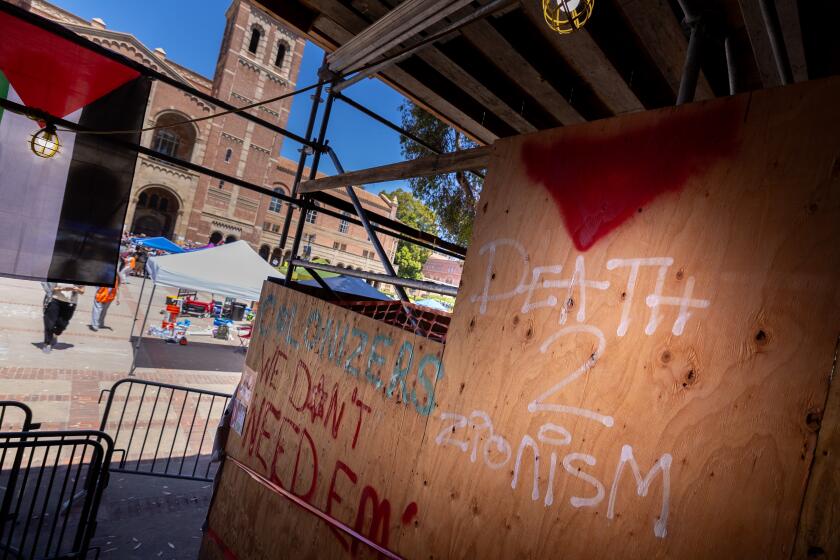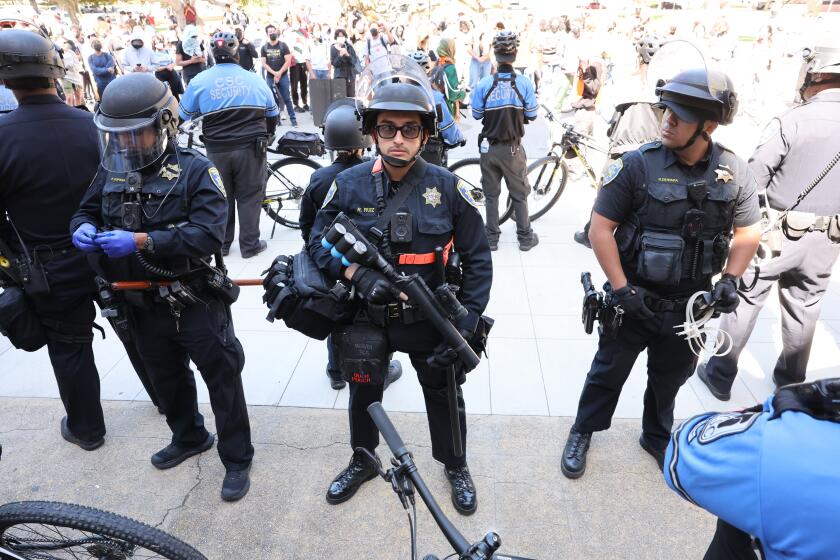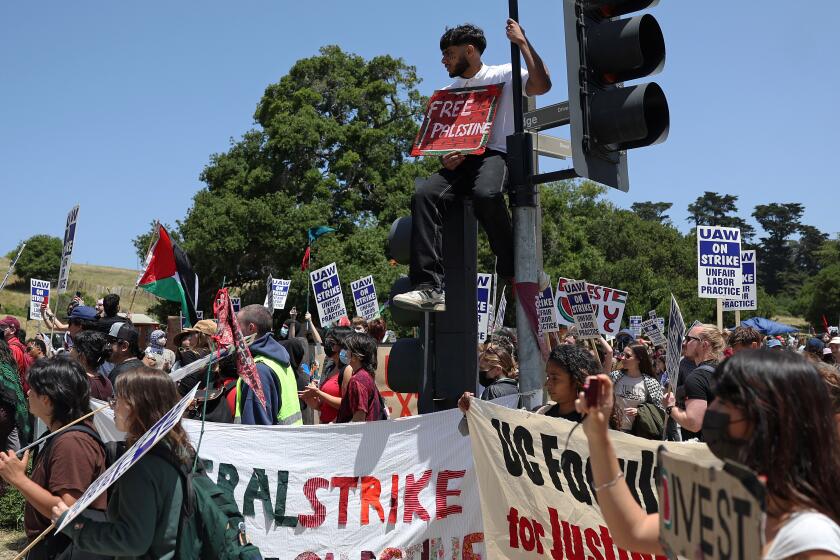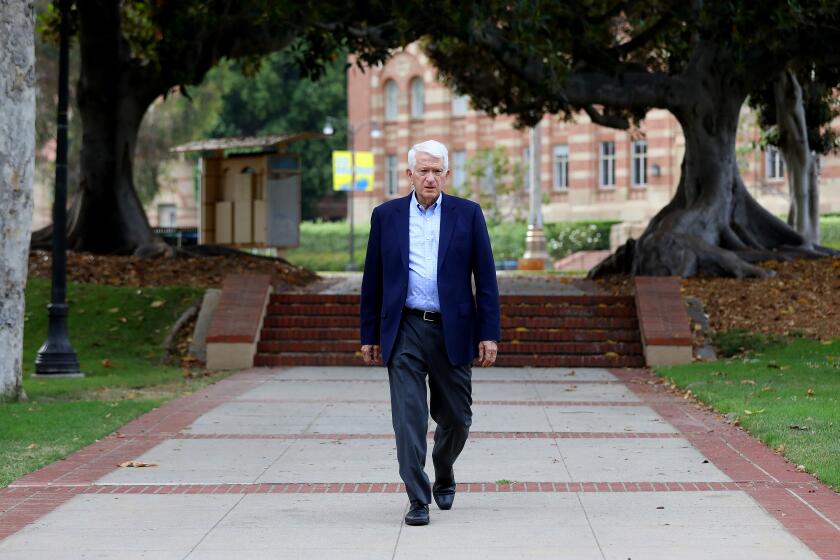‘You should be ashamed,’ congresswoman rails against UCLA chancellor during antisemitism hearing
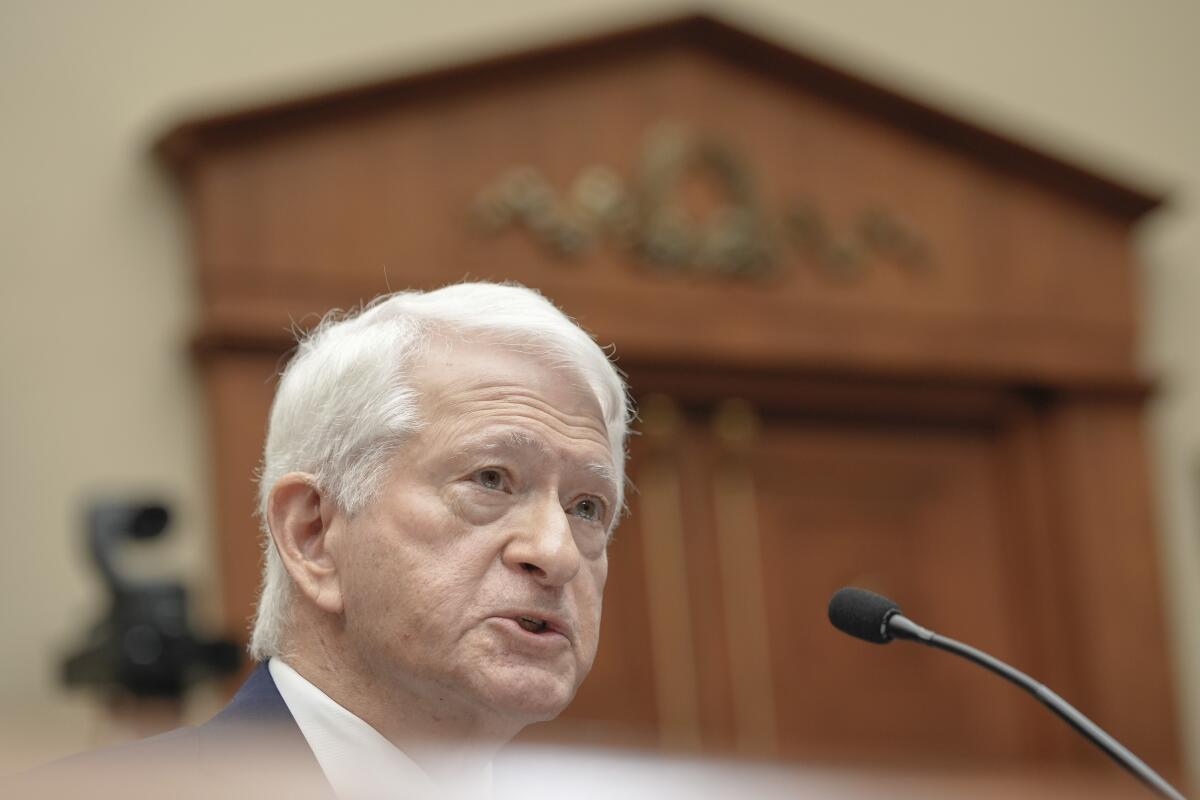
WASHINGTON — A House committee grilled UCLA Chancellor Gene Block Thursday about pro-Palestinian protests as he faced off with lawmakers over how he handled of a violent mob attack last month on a campus encampment and accusations that the university has failed under his leadership to address a rising tide of antisemitism.
Block, who testified alongside the presidents of Northwestern and Rutgers universities, was soft-spoken and at times vague in response to questions on UCLA’s role in resolving campus tensions that have grown since the the Oct. 7 Hamas attack on Israel and its retaliatory war in Gaza. Block said he could not fully answer questions about issues including the status of students who are facing disciplinary action for violating UCLA rules and the state of police investigations into agitators who attacked an encampment overnight on April 30 amid a hours-long delayed police response.
“I don’t know if that’s ongoing,” Block said about a police investigation into allegations of antisemitic threats against a UCLA professor and her husband. He responded, “We’ll see what happens” regarding a disciplinary processes prompted by complaints that Jewish students were prevented from accessing parts of campus by pro-Palestinian protesters.
Questions over Block’s leadership catapulted to the national stage just two months shy of his departure from the chancellor role. The hearing by the Republican-led House Committee on Education and the Workforce focused on campus antisemitism. In tense exchanges, Republicans largely targeted president Michael Schill of Northwestern and, to a lesser extent, Jonathan Holloway of Rutgers. Both leaders recently came to agreements with students to take down pro-Palestinian encampments.
Democrats, who make up 20 of the 44 members of the committee, criticized Republicans as not being serious in their pursuit to combat antisemitism. Members of the House minority have called the hearings an attempt by the chamber’s Republicans to use campus unrest for political gain, and pointed out that no similar hearings have been convened on anti-Muslim or anti-Arab hatred, which have also increased.
Ever since the Israel-Hamas war began last year, student protesters from California to New York have called on schools to divest. But administrators say it is not so simple.
Some faculty at UCLA said the congressional event was unhelpful.
Judea Pearl, an Israeli American professor of computer science at UCLA, said the testimonies fell short because the presidents “did not say anything.” Pearl, who has for decades organized faculty to combat antisemitism and anti-Zionism, criticized Block, Schill and Holloway for being “vague and talking about investigations and tasks forces that go nowhere.”
Block highlighted “claims of disrupting access [to campus] instead of handling actual instances of repeated violence against pro-Palestinian students, which of course included many Jewish students,” said Yogita Goyal, a professor of English and African American studies. Goyal, who said Block “failed” to protect students, pointed out that he did not confirm that suspected April 30 attackers have been arrested despite media outlets that identified several alleged assailants.
Todd Wolfson, a media studies professor and president of the Rutgers faculty union who traveled from New Jersey to Washington for the hearing, described it as a “show trial.” But he said some Democrats asked questions that got to the root of the issue — how to walk the line between allowing freedom of speech and assembly while protecting against antisemitism and anti-Muslim sentiment.
“That’s an important thing to figure out,” he said. “It’s not so clear.”
Four Californians sit on the committee — Republican Reps. Michelle Steel and Kevin Kiley and Democratic Reps. Mark Takano and Mark DeSaulnier.
Republicans accused Schill and Holloway of “giving in” to protesters, who — like those at UCLA — had asked for their universities to divest their endowments from weapons companies and ties to Israel. Each university, including UCLA, has rejected the call.
At UCLA, the legacy of the encampment remains an issue of much debate, particularly among Jewish students.
Rep. Elise Stefanik (R-N.Y.) questioned Schill on allegations of assault and stalking of Jewish students on campus. Schill said the university “believes in due process” but that he did not have a timeline to offer on the “‘lots of investigations” underway.
Rep. Burgess Owens (R-Utah) pointed critically to Northwestern’s connection to Qatar, where the university has a campus, suggesting the relationship was tainted because Hamas leadership is based in Doha. He also attacked a training program that’s existed between the journalism school and Al Jazeera.
Schill and Holloway defended their pacts with protesters. Schill said the agreement at Northwestern gave students “the ability to feel safe on campus.” Holloway shot back at Republicans who labeled protesters as “pro-Hamas.” “They were not, as some have characterized them, terrorists. They were our students,” Holloway said.
The hearing did not provoke the explosive moments that unfolded in December, when the committee’s first session on campus antisemitism contributed to resignations from the presidents of Harvard and the University of Pennsylvania. During those testimonies, university leaders stumbled when asked how their campuses would handle calls for the genocide of Jews.
In his opening remarks, Block said that, “with the benefit of hindsight,” the university should have acted to “immediately remove” a campus pro-Palestinian encampment “if and when the safety of our community was put at risk.”
Block, who is Jewish, said that “as a public university, UCLA is subject to a dual legal mandate: we have a legal obligation under the 1st Amendment to protect free speech on campus, as well as a legal obligation under federal law to protect students from discrimination and harassment. This balance is not always easy to achieve.”
The chancellor faced his one of his toughest moments when questioned by Rep. Ilhan Omar (D-Minn.) about the April 30 night of violence at the UCLA encampment. Omar said the images from UCLA were “appalling,” but even worse was “that it was completely preventable.” The Democratic congresswoman told him multiple times that he should be “ashamed” for the injuries that took place under his watch.
“You, the UCLA leadership and law enforcement stood by for hours as the mob of agitators gathered near the encampment with a clear intention to cause violence,” she said. “I would like to know if you are truly committed to keeping your students safe. How did you fail these students at many critical points where you could’ve intervened?”
“Thank you for the question, but I’m sorry but I reject the premise,” Block replied, saying that UCLA is working with LAPD to identify attackers. He said the university “tried to to get police there as quickly as possible.”
UCLA Police Chief John Thomas has been reassigned after facing sharp criticism for security failures that led to violence at pro-Palestinian protests.
Block was also asked about the current protests. “There are no encampments,” he said, shortly before 8 a.m. — just as new encampment went up outside Kerckhoff Hall at UCLA.
Amid a show of police in riot gear, the new small camp was dismantled in the early afternoon. A crowd that grew to hundreds relocated to Dodd Hall and the surrounding area by late afternoon.
The protests were timed to Block’s testimony, as was an announcement that unionized UCLA academic workers would go on strike Tuesday after alleging that the university violated their rights to free speech when the large encampment was dismantled by police on May 2 and roughly 200 were arrested.
Republicans brought up a viral video and news reports about Jewish students who complained that UCLA activists set up checkpoints restricting access to the encampment area after it went up on April 25. Some Jewish students have told The Times that they felt intimidated as activists blocked pathways, while other Jewish students who participated in the encampment, argued that it was not antisemitic, but anti-Zionist.
“Why did you fail to immediately clear these checkpoints?” committee Chair Rep. Virginia Foxx (R-N.C.) asked Block.
Academic workers walk out to support participants in the pro-Palestinian protests. UC officials call the strike illegal. It could spread to other campuses.
Block said he issued instructions to staff to make sure that all the students could freely pass without obstruction and then sent out a campus-wide memo on April 30, telling students that the university would not tolerate the blocking of access to parts of campus.
“Did it stop as a result of what you said?” the congresswoman asked. “I believe it did,” Block said. He was later questioned again on the matter by California Republican Rep. Kevin Kiley.
Foxx also asked presidents how many students had been suspended or expelled since Oct. 7 for antisemitic comments. Block said there are more than 100 active investigations evaluating cases of antisemitism and Islamophobia at UCLA.
The hearing also turned to events prior to the spring encampments.
Rep. Aaron Bean (R-Fla.) asked Block about an incident reported in November when a professor and her husband attended a counterprotest at a UCLA pro-Palestinain rally. The couple, who wore pro-Israel shirts, said they were threatened with violence. The next day, they said, a UCLA student from the rally attempted to visit the husband at his office.
“All this was reported to you and other UCLA officials, including the identity of who’s doing it,” Bean said to Block. “What disciplinary actions did UCLA take in response?”
“We immediately alerted the police and the police did an investigation,” Block said. “I don’t know if that’s ongoing or not, but police were involved immediately in this incident.”
Rep. Michelle Steel (R-Seal Beach), asked Block whether he had disciplined a professor who allegedly offered extra credit to students who protested. Block said he wasn’t aware of that incident. Steel asked Block whether he was investigating an incident in which a lecturer allegedly led first year medical students in a “free Palestine” chant. Block replied that the university was investigating the allegation but that he did not have more details.
In his opening remarks, the ranking Democrat on the committee, Rep. Bobby Scott of Virginia, said the hearing was the wrong way to address a real problem. “Here we are, for the fifth time in six months, holding another hearing to complain about the problem of antisemitism, but no work is being done to find a meaningful solution to address animus on college campuses. Complaining about the problem is not a solution.”
A group of about 40 graduate students and faculty from UCLA, Rutgers and Northwestern showed up to the hearing, packing the hallway outside. They included John Branstetter, a UCLA lecturer in the political science department, who said he was among faculty members arrested at the camp.
UCLA Academic Senate voted against censuring Chancellor Gene Block or saying it had ‘no confidence’ in his leadership
“This committee is completely missing the point,” Branstetter said. “We’re trying to set the record straight.”
Branstetter said he watched as students he had taught for years were sprayed in the eyes and shot with beanbags. Police threw him to the ground, he said, giving him a bloody knee and bruises. He had visible handcuff marks and said he was still experiencing wrist pain. He said Block should resign.
“The suppression of civil rights came at the hands of Gene Block,” he said. “His only answer to the question of ‘how do you keep students safe’ is to arrest them. I don’t feel safe on campus having him as chancellor.”
After a 17-year career at UCLA, Block announced last year that he would step down at the end of July. A biologist, he plans to return to teaching and research.
More to Read
Sign up for Essential California
The most important California stories and recommendations in your inbox every morning.
You may occasionally receive promotional content from the Los Angeles Times.

